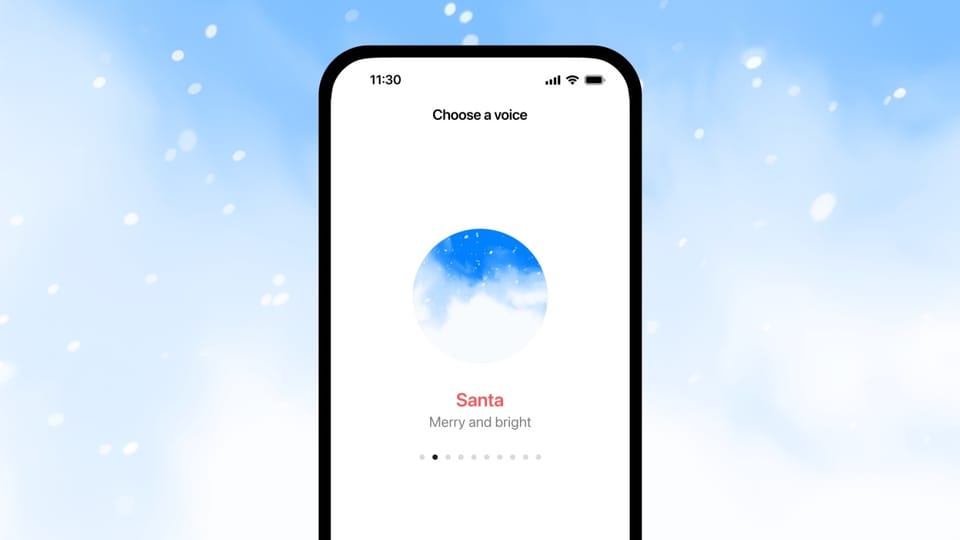Growing Up AI-First

Earlier today, I found myself at a museum sitting next to a student. They had a notebook open, and on the right side they were jotting down thoughts about the exhibit. On the left side was their iPhone, with ChatGPT open. This wasn't in the heart of Silicon Valley, this was in Copenhagen. AI is already everywhere.
I'm not suggesting there was something rotten in the state of Denmark. I don't think the student was using ChatGPT to cheat in some way. I obviously didn't want to stare at what they were doing or pry too much, but it seemed to me that they were using the AI to augment their understanding of the art they had seen. At least, that's what I'm going to choose to believe. Regardless, the encounter further drilled into my head just how ubiquitous the technology already is – barely two years after the launch of ChatGPT.
I know parents with kids of a certain age are already well aware of this. And we've all read the trend pieces about such technology revolutionizing cheating, just as the parents 15 years ago read such pieces about smartphones, just as the parents 30 years ago read such pieces about calculators. My kids aren't yet at the age where they'd be using such tools day-to-day, but I find myself already thinking through what this is going to be like. It's starting to come into focus...
Over the holidays, my older daughter's favorite thing in the world was the "Santa Mode" that OpenAI rolled out as a part of their '12 Days of Shipmas'. It was exactly what it sounds like – ChatGPT's voice mode with a special jolly voice (and clever snow sprites/graphical flourishes). As far as I know, it was her first encounter with AI, at least the explicit use of it. I handed her my phone one night and told her to "say hello to Santa". It took a while to get the phone back. There was just non-stop excitement and laughing. This reads like an ad for ChatGPT but really it's just a testament to how well they've done on the product-side of AI.1
She was, of course, curious how this worked. How was Santa on the phone? She's old enough to know that this wasn't likely the real Santa (who of course only resides at Lapland), but still, she wanted to know how she could talk to him at any time and more importantly, how he seemed to know everything. While walking a fine line of being honest and dampening holiday magic, I tried to explain the concept of AI, taking into account the knowledge of everyone, including Santa.
Now, whenever a question about basically anything arises, she instructs me to "ask my phone". That's her way of asking me to ask ChatGPT something. What's perhaps most interesting about this is that she knows that I worked for Google for a long time. She knows what Google is. But ChatGPT is seemingly the interface that has her most intrigued here – and ChatGPT's voice mode, in particular.2
Obviously, Google has such a mode as well for Gemini. But they don't have Santa. Meta has, um, Judi Dench? But they don't have Santa.3
All of this is hardly surprising to me. I've been writing for years and years about the potential for voice-based interfaces as the most "natural" form of computing. But I was wrong in thinking that Amazon would own this space thanks to Alexa. For a while it seemed like even though Apple, for once, had the first-mover advantage with Siri, Amazon's strategy of ubiquity would win the day. But as it turns out, both of them were actually far too dumb to win much of anything aside from the weather.4 Being too early is now proving to be a major problem for Amazon. Apple too, though their Siri problems seem to run even deeper...
Anyway, whereas I used to wonder how the rise of touchscreen devices would impact my daughter's computing trajectory, then wondered the same with Alexa usage, now my thoughts are all AI all the time in this regard. What does it mean when she'll have a tool that she can ask anything of and get a response?
Again, we've all had Google for 25 years or so now, but it's different in a way that I didn't fully appreciate until watching how others, and in particular younger people, use such technology. Using Google to search for things must feel like using an abacus to do math at the dawn of calculators. The old tool is still a useful one, but so much more work than the newer technology.
I just can't quite imagine my children having a question and needing to dig through links to websites to find the answer.5 For some things that will still be useful. But for most things, you just want the answer, of course. This sounds so obvious when typed out this way, but it's one of those things that is only really clear in hindsight, with such a future already in sight. And yes, it should have Google worried. Not because Search will be abandoned en masse, but more so the generation growing up learning to use AI-first.
I'm reminded of the cable industry. Yes, cord-cutting mattered, but really it was the "cord nevers" – those that grew up without ever paying for cable TV – that were the real problem.
To state the obvious: Google better hope and do everything possible to make sure that the AI all these kids grow up using is Gemini and not ChatGPT or anyone else's. And they seemingly are – to the tune of $75B in CapEx this year. But that alone won't be enough, as my friend at the museum can attest. Google has perhaps have the tallest task of anyone in the space because it's also an internal Innovator's Dilemma situation.6 And that mixed with other (natural but real) issues just up the pressure here.
At the same time, at an even higher level, we're clearly going to have to figure out how education will have to morph in the age of AI. And while banning smartphones in schools may make sense for other reasons, it's not going to put this particular genie back in the bottle. The solution is clearly going to have to be more in line with doing math in the age of calculators, learning the basics you need to know to understand and then learning how to utilize the amazing technology we have to augment and extend our own capabilities. Easier said than done.
But I go back to the notion I've tried to think through with regard to even just Hollywood's disruption with such technology. I believe that while there will clearly be a period of turbulence as we all figure out how to navigate the world with such tools, it will elevate many types of work and life that perhaps aren't obvious right now. I think that will include actually pushing up the value of fully human work across the arts. And while it may be easier not to learn how to say, write, thanks to AI, it will also be far more valuable to know how to do so.
The kids will be alright, but their world will also be very different.7 At least, that's what I choose to believe.
Update: Per the point about Google needing an answer for this surge in AI and kids being trained to use it instead of Google Search, today comes a report about the company now testing an "AI Mode" for search internally...

1 We can argue about whether or not Google's AI is technically better, but without question, OpenAI's work is more user-friendly. (And far more discoverable.) And "Santa Mode" was the epitome of this.
2 That said, it was interesting how she really wanted to look at the screen even in voice mode. Perhaps this was just the aforementioned nice graphical flourishes, but there might be something more to this notion -- something which Amazon may be wise to pay attention to with Alexa...
3 I mean, just imagine focusing your efforts on paying Judi Dench and Awkafina millions of dollars but not getting voices that the actual user base for such features, kids, will care about. Imagine getting Kristen Bell but not as Anna from Frozen! Then again, Meta likes to do such things over and over again.
4 And perhaps music and timers, I suppose.
5 I know this will upset many people and perhaps disrupt many businesses, but it would also be silly to ignore this inevitability and just pretend like it won't happen. We need to think through and talk through this stuff now!
6 Something I wrote about just yesterday with regard to Meta in trying to reboot "OG Facebook".
7 OpenAI's new "Deep Research" mode just adds to all of this. I've been testing it out over the past few days, and it's rather incredible. The reports are far too dry for my taste but they're certainly comprehensive. But actually, count me with Casey Newton in thinking this tool is most interesting when paired with a subject you already know quite a bit about. It gives you new vectors of thought, while also giving you more confidence that the information is actually accurate versus just bullshit stated with certainty.

